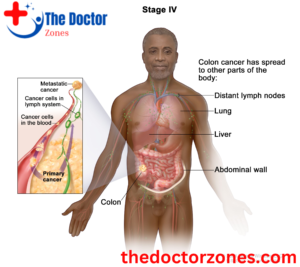Stage 4 Colon Cancer: Stage 4 colon cancer life
Colon cancers in stage IV have migrated to distant organs and tissues from the colon. The liver is the primary site of metastasis for colon cancer, although it can also move to the brain, peritoneum (the lining of the abdominal cavity), lungs, or distant lymph nodes.
Understanding Stage 4 Colon Cancer: Symptoms, Treatment, and Prognosis
Stage IV colon cancer is the most advanced stage of colon cancer, characterized by the spread of cancer cells beyond the colon to other organs and tissues. This metastatic colon cancer often primarily spreads to the liver, but it can also reach the lungs, abdominal cavity, and distant lymph nodes. The diagnosis of stage 4 cancer brings significant challenges, both physically and emotionally, making understanding its implications crucial for patients and their families. Also Read more articles How I Knew I Had Colon Cancer
What is Stage 4 Colon Cancer?
Colon cancer metastasis occurs when cancer cells break away from the primary tumor in the colon, invade nearby tissues, and travel through the bloodstream or lymphatic system to form new tumors in other parts of the body. This complex process complicates treatment options and significantly impacts the colon cancer prognosis.
Late-Stage Colon Cancer Symptoms

Recognizing the late-stage colon cancer symptoms is vital for early intervention. Common symptoms include:
- Unexplained weight loss
- Persistent abdominal pain
- Changes in bowel habits
- Fatigue
- Jaundice, which may indicate colon cancer spread to the liver
If you experience these symptoms, it is essential to consult a healthcare professional for proper evaluation and diagnosis.
Diagnosis of Stage 4 Colon Cancer
Diagnosing advanced colorectal cancer typically involves a series of tests, including:
- Physical examination
- Blood tests to check for tumor markers
- Colonoscopy for direct visualization
- Biopsy for tissue analysis
- Imaging tests such as CT, PET, ultrasound, or MRI scans to assess the extent of the disease
These diagnostic procedures help determine the most effective stage 4 colon cancer treatment plan tailored to the individual’s needs.
Treatment Options for Stage 4 Colon Cancer
The treatment landscape for advanced colorectal cancer is multifaceted and often involves a combination of therapies. Options may include:
1. Surgery
Colon cancer surgery options can be limited in stage 4 cases, but if the cancer has only spread to a few small areas, surgical intervention may still be beneficial. Surgery aims to remove the primary tumor and affected surrounding tissues. In some instances, it may also involve the removal of metastatic tumors.
2. Chemotherapy
Chemotherapy for advanced colon cancer is a cornerstone treatment that uses powerful drugs to kill cancer cells or prevent their growth. It is often used in conjunction with other treatments and may be administered before or after surgery to enhance effectiveness.
3. Targeted Therapy
Targeted therapy for colon cancer focuses on specific molecules involved in cancer growth, reducing damage to healthy cells. This approach can be used alongside chemotherapy for improved outcomes.
4. Immunotherapy
Immunotherapy for colon cancer is an evolving treatment that helps harness the body’s immune system to fight cancer. It has shown promise, particularly for patients with specific genetic mutations.
5. Palliative Care
For those experiencing severe symptoms or where curative treatment is no longer an option, palliative care for colon cancer becomes crucial. This approach focuses on improving quality of life by managing pain and other distressing symptoms.
Living with Stage 4 Colon Cancer

Living with stage 4 colon cancer can be overwhelming. It is essential to develop coping strategies and build a robust support system. Engaging with colon cancer support groups can provide emotional strength and connect patients with others facing similar challenges.
Nutritional Support for Colon Cancer Patients
Diet plays a vital role in the overall well-being of individuals battling cancer. Nutritional support for colon cancer patients can help manage treatment side effects, improve energy levels, and enhance recovery. A balanced diet rich in fruits, vegetables, lean proteins, and whole grains is often recommended.
Monitoring and Follow-Up Care
Regular follow-up care is crucial for detecting any signs of colon cancer recurrence. This may include routine check-ups, imaging tests, and blood tests. Patients are encouraged to maintain open communication with their healthcare providers to adapt their care plans as needed.
Stage 4 Colon Cancer Survival Rate
The stage 4 colon cancer survival rate is significantly lower than earlier stages, with a 5-year survival rate of about 13%. However, individual outcomes can vary widely based on various factors, including age, overall health, and response to treatment. As treatment methods advance, these rates may improve over time.
The Role of Clinical Trials
Participation in stage 4 colon cancer clinical trials can provide access to cutting-edge treatments and contribute to ongoing cancer research. Patients should discuss this option with their healthcare team to explore potential eligibility and benefits.
Conclusion
Navigating the complexities of stage IV colon cancer requires a comprehensive approach involving medical treatment, emotional support, and lifestyle adjustments. While the journey is undoubtedly challenging, advancements in treatment and the power of community support offer hope for better outcomes. Remember, you are not alone in this journey, and resources are available to help you manage your health and well-being.
FAQs
Q: Can stage 4 colon cancer be cured?
A: While a cure may not always be possible, treatments aim to manage and control the disease, offering improved quality of life.
Q: Are there alternative therapies for stage 4 colon cancer?
A: Complementary therapies, such as integrative medicine and holistic approaches, can complement traditional treatments and enhance overall well-being.
Q: How can I find emotional support during my cancer journey?
A: Support groups, counseling services, and online communities are valuable resources for emotional support.
Q: What financial assistance is available for stage 4 colon cancer treatment?
A: Various financial assistance programs exist to help individuals manage the financial aspects of their treatment.
Q: Is participation in clinical trials recommended for stage 4 colon cancer patients?
A: Participating in clinical trials can provide access to innovative treatments and contribute to advancements in cancer research.








